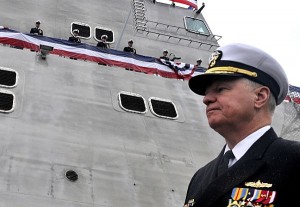…and Austal got the lowest per-unit award? Interesting.
When all 10 ships of each block buy are awarded, the value of the ship construction portion of the two contracts would be $3,620,625,192 for Lockheed Martin Corp., and $3,518,156,851 for Austal USA. The average cost of both variants including government-furnished equipment and margin for potential cost growth across the five year period is $440 million per ship. The pricing for these ships falls well below the escalated average Congressional cost cap of $538 million.
It will be an interesting couple of years as we watch the two companies work to make good on their price targets. But if they do, and the contract is successful, what will it mean for the nearby cities?
Al.com’s Dan Murtaugh got in touch with Loren Thompson, Jay Korman and myself to discuss the potential impact. Loren reported the obvious–that a job in the shipyard will support others off-site, and Jay suggested that subcontractors will move operations nearby (aside from General Dynamics, which is obviously going to move some folks down there in a goodly amount). I talked about the wider impact of Austal–and how the company, though successful growth and operation, has become a fantastic billboard for Mobile’s business community. In my mind, nothing attracts success like, well, success. Here’s the article:
Craig Hooper, a shipbuilding analyst based in San Francisco, said Austal’s rapid success – the company laid down roots in Mobile only in 2001 – could help convince suppliers and others that the city is good for business.
“Had Austal moved to a less business-friendly city, like San Francisco, Austal would still be a tiny concern – with all the manager’s energy absorbed in zoning fights,” Hooper said.
“Austal has demonstrated Mobile makes a great home for high-tech manufacturers,” he said. “It is rare for cities to partner so seamlessly with high-tech companies experiencing triple-digit growth, and that in itself is a huge selling point for companies looking to embark upon new ventures.”
It’s no secret that Austal scouted the U.S. for a potential site–and yeah, there are days when I wish that Austal had landed in San Francisco or Alameda or someplace else nearby. But, pro-Bay-Area feelings aside, it is just really, really hard for a big-stuff manufacturing concern to get established and grow here. And that’s a huge problem. Seeing a company grow from a few temporary trailers into a thriving thousand-employee concern–all while still being on good terms with City Hall and unencumbered by NIMBY legislation–is a big, big selling point.
Combine that with Austal’s work in recruiting, training and retaining good employees, add in a bit of local stewardship/outreach from the company, and then, well, let’s just say that the job of promoting Mobile just got a lot easier.
It’ll be interesting to see what goes on up at Marinette Marine–and who takes the credit for the economic boost both regions will get from this nice bit of economic stimulus.


{ 2 comments… read them below or add one }
It’s not a coincident that Hundai and Kia have just built new plants in Alabama as well. Communities are willing to work with Manufacturers to get the job.
Good article and I too would of loved to see the Austal shipyard built in the Seattle area. Question though why do you think new shipyards can’t get established on the west coast?